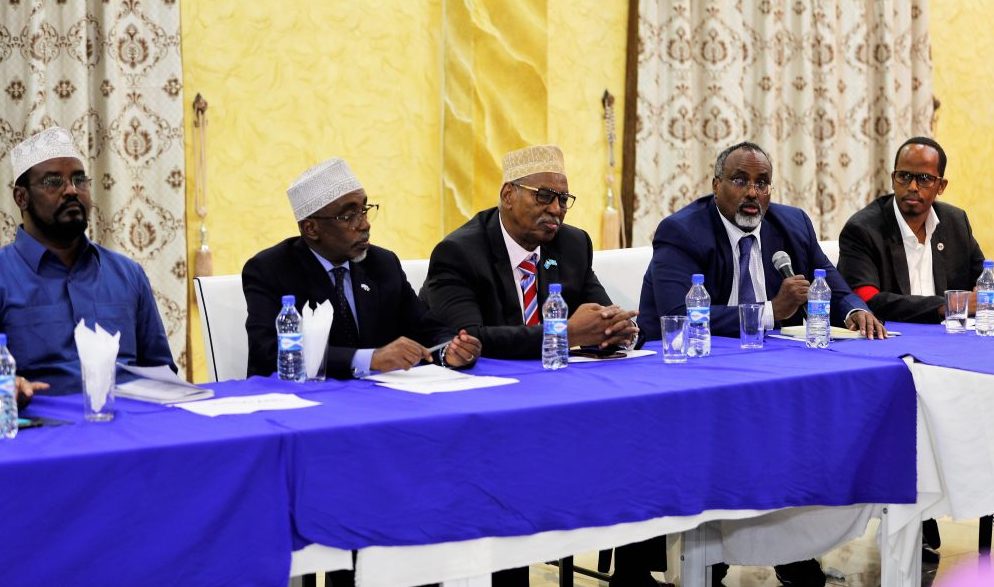Fed and State leaders say differences settled but silent on Gulf dispute


Federal and state leaders meeting in Mogadishu over the past one week said Sunday they had agreed to settle their difference and forge a unity of purpose following months of thawing relations between the two levels of governments over a series of political feuds among them positions on the Gulf Crisis.
In a communique Sunday the leaders led by President Mohamed Farmaajo said they agreed to ‘collectively work in an atmosphere of trust, unity, compromise, consultation and collective responsibility’.
But there was no mention as to whether they had agreed to find a common ground regarding differences on the Gulf Crisis which has sharply divided the two levels of government.
UNEASE
Sources privy to the meeting said there was unease earlier in the week on the wording of the communique especially on a strong wording for federal government interference on federal state governments. Federal State leaders under the Cooperation of Intergovernmental Council (CIC) have variously accused Mogadishu of attempts to destabilize the federal states citing the Galmudug case which saw the Federal Government endorse a controversial vote to remove the state president Ahmed Haaf.
Instead, the leaders said, “We agreed to abstain and halt everything that can bring doubt and political tension; that can affect stability, collaboration between Somali federal government and regional member states and Banadir region.”
POWERS AND RESPONSIBILITIES
Regarding constitutional powers and responsibilities, the communique pointed at strengthening relations and collaboration between the two levels of government and ‘respecting the specific and general constitutional responsibilities bestowed upon each level’.
While the Federal Government has maintained exclusive authority and power over monetary policy, foreign affairs, immigration and citizenship and National Defense as contemplated by article 54 of the Provisional Constitution, Federal Member States have sought refuge in the preceding article (53) which provides for consultation between the two in regards to international negotiations. The article however confines itself to ‘negotiations relating to foreign aid, trade, treaties, or other major issues related to international agreements’.
There was however no mention or clarity on the Gulf Crisis issue which has been the epicentre of feuds between the Federal Government and States. Majority of the states, (Galmudug, South West and Puntland) and Somaliland have all broken ranks with the Federal Government to side with the Saudi-UAE faction.
TECHNICAL COMMITTEE
The fate of the CIC which the Federal States said would champion their collective interests among them issues on federalism remains unclear since the communique talks of creation of a technical committee to oversee the implementation of the federalism agenda. The committee, the communique reads ‘will work on defining distribution of powers between the federal and state governments and resources sharing’. The committee has been given a 6 months deadline to submit its findings.
The leaders also noted the need to enhance the participation of the Upper House in implementing the federal agenda including through the legislative process. The Upper House Sunday voted to have a role in debating the national budget but postponed a vote on its role in vetting the Prime Minister and Council of Ministers.
Issuance of passports and certificates of certificates will now be done in the regional governments, the leaders said.
CONSTITUTIONAL REVIEW
On Constitutional review process and elections, the leaders said they agreed to increase funding to the National Independent Electoral Commission (NIEC) to enable it prepare the country for the 2020 elections including a 90 days public consultations to reach political agreements on challenges facing the electoral process.
The leaders directed the finance ministry to increase the budget for the constitutional review process in 2018 fiscal year.
A technical committee will oversee the distribution of humanitarian assistance and foreign aid in an equitable manner, the leaders said.